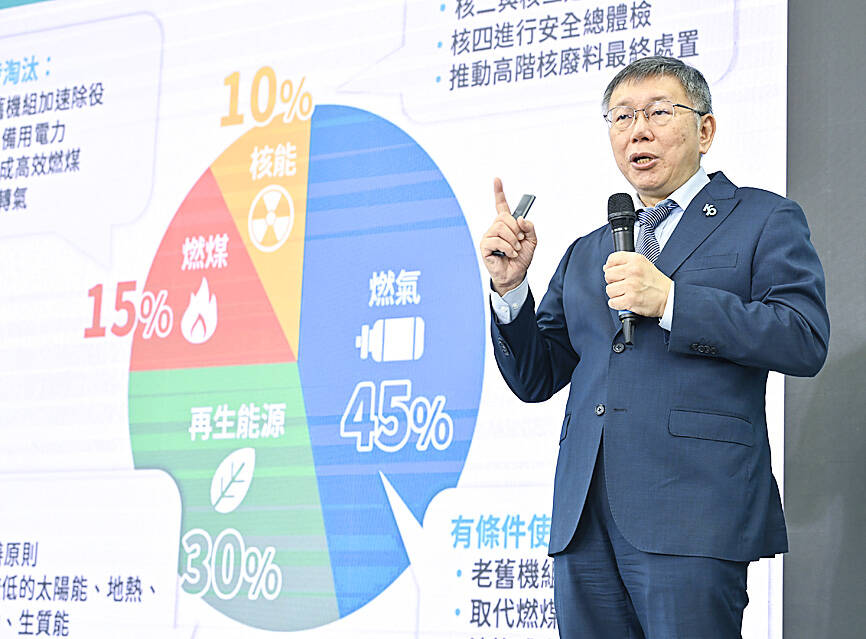Taiwan People’s Party (TPP) presidential candidate Ko Wen-je (柯文哲) on Wednesday presented his energy policy, calling for a transition to sustainable energy and extending the lifetime of two nuclear power plants.
By 2030, the nation’s energy composition would be 45 percent gas, 30 percent from renewable sources, 15 percent coal and 10 percent nuclear energy, Ko told a news conference.
The TPP chairman said that the carbon emissions reduction goal set by the government in 2020 to lower emissions by 2 percent from the 2005 baseline was a failure, as emissions increased by 2.6 percent in 2021.

Photo: Chen Chih-chu, Taipei Times
He also criticized the government’s approach to developing renewable sources and the work of the National Council for Sustainable Development, established in 1997 under the Executive Yuan.
If elected, he would set up a climate change and sustainability committee that would invite representatives from government agencies, academia, civic groups, youth and other stakeholders to draw up strategies for the nation’s sustainable development, Ko said.
He would also propose allocating carbon emissions quotas based on sectors, regularly examine the results of carbon emissions reduction initiatives and set up a transition fund paid for by carbon fees to promote balanced development, he added.
Other than relying on a wide range of energy sources to lower Taiwan’s dependence on imports, the development of renewable sources and investment in green technologies should also be encouraged, he said.
Nuclear power is necessary for the country’s energy transition and the most pragmatic way is not to set a deadline to “stop nuclear power,” which should only be done when renewable sources are sufficiently developed, he said.
He proposed extending the operation of the Guosheng Nuclear Power Plant in New Taipei City’s Wanli District (萬里) and the Ma-anshan Nuclear Power Plant in Pingtung County, and re-examining the operability of the Fourth Nuclear Power Plant in New Taipei City’s Gongliao District (貢寮).
The decommissioning of the Guosheng plant started this year and the Ma-anshan plant is to begin shutting down next year.
To minimize disputes over renewable energy development projects, Ko proposed setting up a coordination mechanism to identify and coordinate the needs of developers before local governments approve projects.
Ko said that Taiwan should have a carbon pricing mechanism that prevents Taiwanese enterprises from being taxed by other countries.
The Democratic Progressive Party’s (DPP) presidential campaign office said in a statement that Ko’s vision of a future with multiple sources of renewable energy while refusing to set a deadline for ending nuclear power was irresponsible.
The DPP also criticized Ko for saying “how nuclear waste should be handled can be discussed later,” while proposing extending the operation of two nuclear power plants.
On Oct. 19, Vice President William Lai (賴清德), the DPP’s presidential candidate, said that he would not rule out using nuclear power if its safety is guaranteed and the problem of waste could be solved.
New Taipei City Mayor Hou You-yi (侯友宜), the Chinese Nationalist Party’s (KMT) presidential candidate, in July said that if elected, he would not phase out nuclear power and would reopen decommissioned plants.

Chinese spouse and influencer Guan Guan’s (關關) residency permit has been revoked for repeatedly posting pro-China videos that threaten national security, the National Immigration Agency confirmed today. Guan Guan has said many controversial statements in her videos posted to Douyin (抖音), including “the red flag will soon be painted all over Taiwan” and “Taiwan is an inseparable part of China,” and expressing hope for expedited reunification. The agency last year received multiple reports alleging that Guan Guan had advocated for armed reunification. After verifying the reports, the agency last month issued a notice requiring her to appear and explain her actions. Guan

GIVE AND TAKE: Blood demand continues to rise each year, while fewer young donors are available due to the nation’s falling birthrate, a doctor said Blood donors can redeem points earned from donations to obtain limited edition Formosan black bear travel mugs, the Kaohsiung Blood Center said yesterday, as it announced a goal of stocking 20,000 units of blood prior to the Lunar New Year. The last month of the lunar year is National Blood Donation Month, when local centers seek to stockpile blood for use during the Lunar New Year holiday. The blood demand in southern Taiwan — including Tainan and Kaohsiung, as well as Chiayi, Pingtung, Penghu and Taitung counties — is about 2,000 units per day, the center said. The donation campaign aims to boost

The Kaohsiung Tourism Bureau audited six hotels in an effort to prevent price gouging ahead of Korean band BTS’ concert tour in the city scheduled for Nov. 19, 21 and 22 this year. The bureau on Friday said that the audits — conducted in response to allegations of unfair pricing posted on social media — found no wrongdoing. These establishments included the local branches of Chateau de Chine, Hotel Nikko, My Humble House, and Grand Hai Lai, it said, adding that the Consumer Protection Commission would have penalized price gougers had the accusations been substantiated. The bureau said the Tourism Development Act

BACK TO WINTER: A strong continental cold air mass would move south on Tuesday next week, bringing colder temperatures to northern and central Taiwan A tropical depression east of the Philippines could soon be upgraded to be the first tropical storm of this year, the Central Weather Administration (CWA) said yesterday, adding that the next cold air mass is forecast to arrive on Monday next week. CWA forecaster Cheng Jie-ren (鄭傑仁) said the first tropical depression of this year is over waters east of the Philippines, about 1,867km southeast of Oluanpi (鵝鑾鼻), and could strengthen into Tropical Storm Nokaen by early today. The system is moving slowly from northwest to north, and is expected to remain east of the Philippines with little chance of affecting Taiwan,